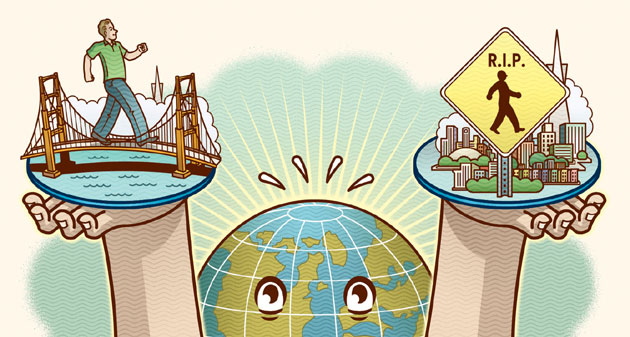sierraclub.org - sierra magazine - may/june 2011 - grapple: as the world warms
"It Was a Mistake" | Sympathy for the Devils | You Get What You Pay For | As the World Warms |
Woe is Us | Up to Speed
AS THE WORLD WARMS
Quick thinking before we slowly fry
You hear it all the time: Solar energy's a nice idea, but it's just too expensive. Southern California Edison begs to differ. The utility recently requested approval for 20 midsize solar-photovoltaic projects, which will generate a total of 567 gigawatt hours of clean electricity more cheaply than natural gas-fueled power plants. As solar grows—15 gigawatts of new solar-photovoltaic generating capacity were installed worldwide in 2010, doubling 2009's rate—prices continue to fall.
Wind power is all the rage on land, but diesel engines rule the seas, generating about 4 percent of the world's greenhouse gases. Britain's largest wind farm operator, B9 Energy, plans to change that equation with renewably powered cargo ships, which will take to the seas in 2012. Propelled by self-adjusting sails and, when the wind dies, biogas backup engines, the freighters will be able to carry 3,000 tons of cargo. B9's initial target market is intra-European shipping, particularly in the breezy Baltic and North Seas.
The Empire State Building is now the King Kong of New York City renewables' purchasers: Its owners signed a deal with Green Mountain Energy to power the entire building with breeze-o-watts. The switch to wind power will eliminate nearly 100 million pounds of CO2 emissions each year—comparable to every household in New York State turning off its lights for a week. —Dashka Slater

Peter and Maria Hoey
ON THE ONE HAND . . .
If you go to San Francisco, be sure to bring your walking shoes. The City by the Bay has been named the nation's most walkable by Prevention Magazine as well as the Web site Walk Score. Its winning attributes include scenic views, mild weather, pedestrian-accessible destinations, and its devotion to hoofer friendliness. And if you get lost there, you're sure to find help: A recent University of New Hampshire study found that those who live in walkable places tend to be more trusting and civic-minded than those who don't.
ON THE OTHER . . .
If you go to San Francisco, you might want to have your will in order. Blame it on the fog, the roller-coaster terrain, or the gadget-distracted drivers, but every year about 800 San Franciscans are hit by cars, making it one of the most dangerous cities for walking in the country; at least half of those killed in San Francisco traffic collisions are pedestrians. Nationwide, pedestrians account for a mere 12 percent of traffic fatalities. —D.S.
Woe is Us